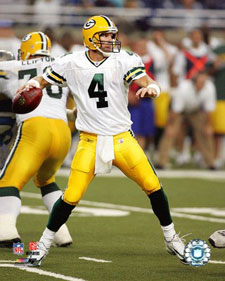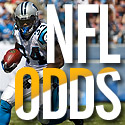Did Favre make the right call?
02/07/2007
Paulsen Home / Sports Channel / Bullz-Eye Home
"It's tough. It's tough. I'm going to miss these guys and miss the game. Just wanted to let them know that. I wasn't planning on doing this, either."
Boy, after that game in Chicago, Brett Favre certainly sounded like someone who was headed for retirement. But everything he said and did during the season gave the impression that the future Hall of Famer would play at least one more year. Last week, the Packers confirmed that Favre is planning to return for his 17th season, and I think it’s a great decision.
In August, he said that he thought the 2006 Packers were the most physically talented team he had played for, but admitted that their relative youth and inexperience could present problems. That lack of experience led to a 1-4 start, and it looked like the team was headed for another miserable season. But the Packers rallied over the next two and a half months, posting a 7-4 mark by winning their last four games. However, that 8-8 record is a little misleading – Green Bay was just 1-5 versus playoff teams, so they did struggle mightily against good competition. However, Green Bay’s late season 26-7 shellacking of the Super Bowl-bound Bears at Soldier Field was impressive. (Bears fans, I know you like to say that the game didn’t matter, but your starters played deep into the third quarter. Get over it.)

one of the best. Playing from behind is
a far different story.
Favre has made it clear that his decision to play has more to do with his own ability to perform than the prospects of his team. And, by most measures, he played pretty well in 2006. Favre threw for 3,885 yards, but his touchdown passes (18) fell for the fourth consecutive season. He did trim his interceptions from 29 to 18, which was probably the result of new head coach Mike McCarthy holding him accountable for his mistakes. This resulted in a quarterback rating of 72.7, a slight increase from the year before. He managed this despite playing behind an offensive line that started two rookies and throwing to an inexperienced receiving corps, which featured the perennially underrated Donald Driver and a bunch of no-names. Greg Jennings emerged as a viable threat, but he was hobbled with an ankle injury for much of the season.
The team ranked 12th in total defense and was mediocre in both rushing (13th) and passing (17th) yards allowed. Over the final four games, Green Bay yielded just 10.5 points, 104 rushing yards and 141 passing yards per game. The Packers were ninth in total offense, but had just the 23rd-ranked scoring offense. The team’s glaring needs are at tight end and running back, and on the other side of the ball, they need someone to help stop the run.
Now that Favre has decided to return for another season, it would seem to bode well for the Packers’ prospects in 2007. New GM Ted Thompson proved that he could draft, landing four starters last summer. Is the team on the verge of dominance? Certainly not. But with another good offseason (and plenty of cap space), the Packers should be poised for a run at the playoffs and it wouldn’t be a huge surprise if they contended in the mediocre NFC.
So what does this mean for Favre? If he’s coming back to get another crack at the playoffs, there’s no reason to think the Packers won’t be capable. Moreover, he is just seven touchdown passes shy of breaking Dan Marino’s all-time record (420) and 3,861 yards shy of breaking Marino’s career record for total passing yards (61,361). But Favre has stated repeatedly that those kinds of records aren’t important to him. It’s all about whether or not he feels he can still play at a high level.
With that in mind, it looks like the Packers need him more than he needs the Packers. Aaron Rogers was the team’s first-round pick in 2005 and everyone assumed he’d eventually take over for Favre. But in Rodgers’ limited playing time, he hasn’t given any indication that he’s ready to take the reins. The league should learn from the way the Packers mishandled this situation. If a team has a Hall of Fame quarterback who is a year (or three) away from retiring, they shouldn’t draft a quarterback to replace him until he finally decides to hang ‘em up. In this age of parity, teams are better off continuing to build around their quarterback and trying to win in the short term. And in all walks of life, you don’t want to be the guy to replace a legend; you want to be the guy after the guy who replaces a legend. So once a player like Farve retires, teams should sign a Brad Johnson or a Jon Kitna for a year or two, draft their QB of the future and go from there.
It’s easy to second guess, but in the ’05 draft, the Packers could have drafted defensive tackle Mike Patterson in the first round. He’s a little on the small side, but he must be doing something right because the frugal Eagles signed him to a seven-year/$32 M extension last season. Keep in mind that the guy has only been in the league two years. Or they could have drafted guard Logan Mankins, who became an instant starter for the Patriots. He’s an excellent run blocker and he would have freed up a pick in ’06, when Green Bay drafted Daryn Colledge and Jason Spitz. Finally, it would have been a reach at the time, but Seahawks’ linebacker Lofa Tatupu has proven that he deserved to be a late first-round pick in 2005. All he’s done is lead his team in tackles the last two seasons. He quickly became the leader of the Seattle defense and is a true playmaker. Ah, what could have been….
But back to Favre. How good is he right now? Having watched virtually every game he’s started over the past 15 seasons, I can say that he hasn’t lost much in the way of velocity or accuracy. His decision-making does seem to be a bit slower, and when that’s combined with his fearlessness, it can lead to trouble. He’s at his worst when his team trails by a big margin. In 2006, his QB rating when the Packers were ahead or tied was 81.4. Including his attempts when Green Bay trailed by 14 or fewer points, it drops to a still-respectable 76.4. When Favre gets down by more than two touchdowns, that’s when the wheels come off, which is the reason he’s probably the most watchable quarterback ever to play the game. With Favre, it might not always be pretty, but you know something exciting is going to happen.
The key for the Packers – or for any team, really – is to build a lead early in the game. When ahead, Favre is still one of the best quarterbacks in the league. The downswing in his numbers over the last two seasons is less about diminishing skills and more about the fact that the Packers are trailing more than they ever have during his career.
In that now-famous post game interview, Favre said that he was planning to make a decision soon, and based on the emotion he showed at Soldier Field that night, I really thought that he had already decided to hang ‘em up.
Boy, I sure am happy I was wrong.
Questions or comments? Send them to jpaulsen@bullz-eye.com.






